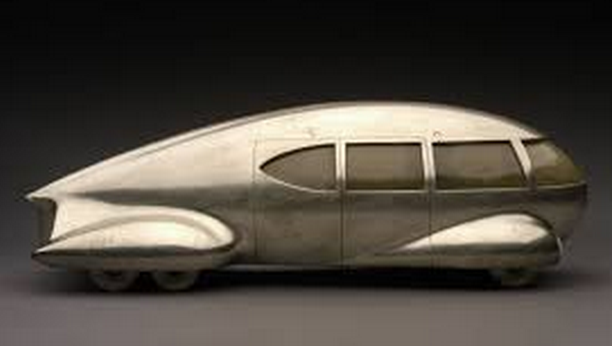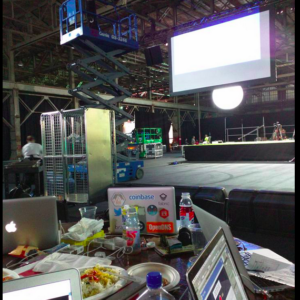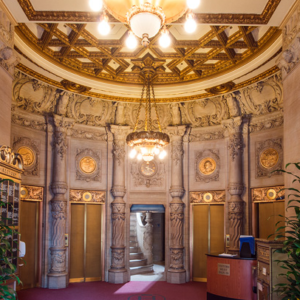Necessity and Invention are NOT Strange Bedfellows.

I have been enchanted by the ethereal concept of ‘the future’ since working as collections assistant at the Harry Ransom Center, a University of Texas Museum in Austin (while attending school). Aside from the Gone with the Wind dress super fans, everyone was in awe of the Norman Bel Geddes’ Futurama collection. Of the thousands of manuscripts and artefacts at the museum, demand was the highest for the model Futurama cars. We got hundreds of letters requesting the cars. Bel Geddes’ collection started out as an exhibit at the NYC World’s Fair in 1939 with lukewarm reception before it reached the future American zeitgeist.
As a student I began to study what we once saw as the future. My self-study led me inevitably to the late, great R. Buckminster Fuller (for whom I named my second cat). Buckminster Fuller is more than a geodesic dome enthusiast. As humanist and inventor Fuller crafted scientific and cultural theories still followed today.
What I admire most is Fuller’s drive. He endured so much personal tragedy, but then created a self-experiment to see how much he could change humanity for the better. What I continue to learn over and over from Fuller is that we must embrace the future! To do so we must harness emerging technologies to scale our inventiveness and improve lives.
I am enthusiastic over humanity’s extraordinary and sometimes very timely ingenuity. If you are in a shipwreck and all the boats are gone, a piano top buoyant enough to keep you afloat that comes along makes a fortuitous life preserver. But this is not to say that the best way to design a life preserver is in the form of a piano top. I think that we are clinging to a great many piano tops in accepting yesterday’s fortuitous contrivings as constituting the only means for solving a given problem.
– R Buckminster Fuller
His piercing statement both precedes and presages the entire environmental movement. It becomes clearer with every passing news article about global warming, poverty, lack of education, and third world conditions in general, that something has to change. I’m elated that this year’s TED@IBM15 event is going to address what’s really happening around the globe and what could happen.
Good Enough is Not Good Enough Anymore.
Once we accept this as a fact, it becomes a call to action to each and every one of us to try to make a difference. “Every little bit helps” is no longer true. It goes against The Law Of Large Numbers. We have to be smarter. Old patterns are broken. New patterns must be forged.
What will empower society to get to the next level?
I believe we are entering the Age of Post-Capitalism. We have lived under Capitalism for hundreds of years; no one alive today has ever even spoken to a person who lived while the dominant economic condition was Mercantilism. But what does post-capitalism mean? I believe it will be primarily defined by Hyper-capitalism. The speed at which business is done will continue to increase, and barriers to said business will continue to come under increasing pressure. Therefore, we know this trend will affect the future of work significantly.
Decentralization / Empowerment
The new language of Earth is Data; numbers flying across wires at speeds impossible for humans to digest. Knowledge in APIs will become more prevalent and desirable than skills in a given language. Anything digitized can be virtualized. Anything that can be virtualized can be decentralized. Anything decentralized can be a platform of global empowerment.
Distance learning will become more common than traditional brick and mortar schools. It is already encroaching on the college experience and traditional universities. What happens when Open Source Courseware has eaten all of the Liberal Arts courses? The only reason to pay for courses will be either the newness of the material, or the skill of the instructor. Eventually, Ivy League schools will be nothing more than brand names that get traded around like corporate subsidiaries. Anyone will be able to get to these courses, and they will be able to interact with others to discuss ideas.
The Maker movement is in its infancy, but it mirrors the cottage industries that were the rise of the Industrial Revolution. This empowers anyone to start a business with little to no capital. You can buy a 3D printer online, or you can order from manufacturers in China today. Once you have an idea, all you need is the intelligence to make it happen, and raw grit to see through problems. These businesses will be the bedrock of the new economy.
I most definitely look forward to attending the upcoming TED@IBM15 event and getting to hear some brilliant minds share their thoughts about the future. Spanning speakers from Kala Fleming discussing what’s on all of our minds- water aquifers in Africa to Aaron Horowitz’s teddy bears that could save children, it’s impressive. I’m excited!
Go to: IBM.com/TED to learn more about the event. Follow during the event with #TEDatIBM
Please note: This post was sponsored by IBM. All of my writing, experiences and opinions- whilst sassy, are my own.





